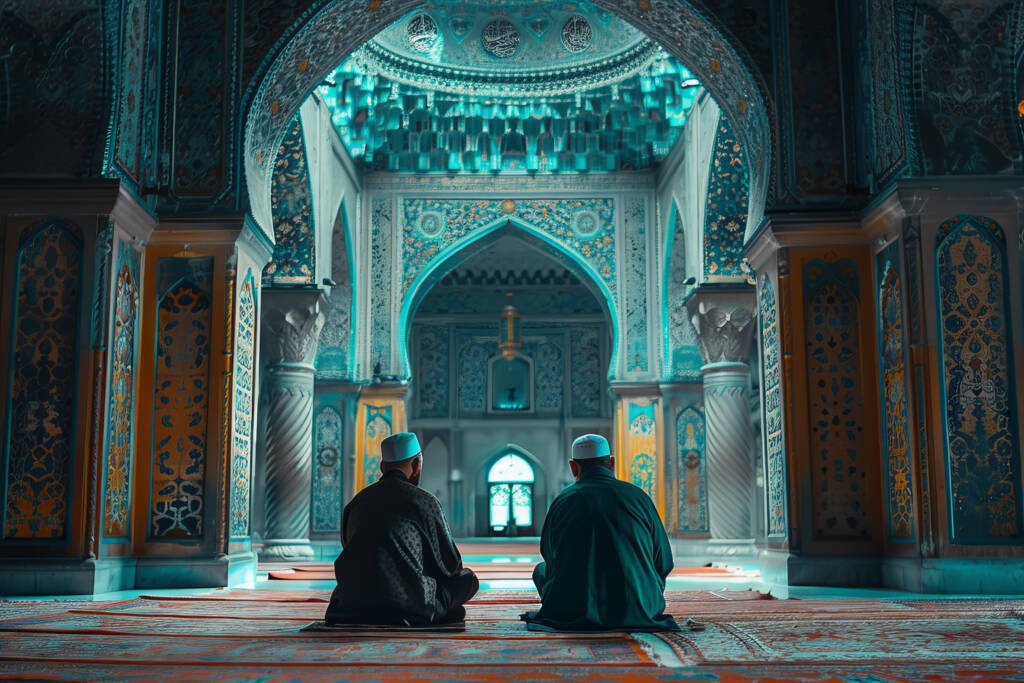Islam, one of the world’s major religions, is a faith that has shaped the lives of over a billion people worldwide, offering spiritual guidance, cultural identity, and moral values. Like many religions, it has a comprehensive code of conduct that touches upon aspects of daily life, ethics, law, and governance. However, in certain interpretations and movements, Islam also extends into the realm of politics, inspiring debates over whether it operates purely as a religion or as a broader political ideology with a mission to influence global societies.
At its core, Islam emphasizes monotheism, compassion, charity, and community solidarity. For centuries, millions of Muslims have lived peacefully, integrating these values into their societies and contributing positively to the cultural and intellectual progress of humanity. Classical Islamic civilization produced remarkable advancements in science, philosophy, and art, making enduring contributions to world heritage. In this sense, Islam, as a religion, provides a moral compass and sense of identity to its followers.
Yet, the political dimension of Islam becomes apparent in certain interpretations, particularly when combined with the concept of jihad, which historically had various meanings but in some circles has been interpreted as a call to political or even military action. Some groups have used Islam as a tool for political influence, aiming for Islamic governance in their regions and, at times, harboring ambitions of establishing a global Islamic state. This idea—rooted in a specific interpretation of Islam—positions it not just as a religion but as a political ideology that seeks to influence governance, law, and society on a potentially worldwide scale.
The 20th and 21st centuries have seen the rise of movements that advocate for a political version of Islam, with aims ranging from the peaceful establishment of Sharia-based laws to extreme forms of jihad and radicalization. Some movements promote a narrative of Islamization, using political mechanisms, education, and demographic influence (often referred to as “population explosion”) to expand Islamic influence. These movements vary widely: some operate within democratic frameworks to implement Sharia-compliant laws, while others use militant tactics to achieve their aims, often leading to violence and extremism.
The rise of radical Islamic ideologies has, unfortunately, led to acts of terrorism and extremism, with some groups employing methods that disregard human rights, morality, and ethics. This has included the exploitation of religion to justify violence, resulting in tragic consequences for people of all faiths and nationalities. From Al-Qaeda to ISIS, these groups represent a minority within Islam but have significantly impacted global perceptions of the religion, drawing associations between Islam and political extremism.
Radicalization, meanwhile, is a complex process often influenced by socio-political factors, economic deprivation, and grievances. Individuals and communities, particularly the youth, may be susceptible to extremist ideologies when faced with political instability, perceived injustice, or economic hardship. Extremist groups exploit these vulnerabilities to promote a version of Islam that prioritizes political domination over spiritual practice, sometimes leading individuals to adopt violent ideologies that starkly contrast with mainstream Islamic teachings.
Another point of debate is the role of population growth in certain parts of the world, where some Islamic leaders encourage higher birth rates as a means of expanding the Muslim demographic influence. This approach is sometimes seen by critics as a strategy for exerting political or cultural dominance in multi-faith societies, with the aim of shifting the demographic balance to eventually shape local laws, policies, and governance in ways that align with Islamic principles. However, it’s crucial to understand that this is not a universal practice among Muslims and is often encouraged only by certain factions with political objectives.
The challenge lies in differentiating Islam as a religion—one that millions of people practice peacefully—from political ideologies and movements that use Islam as a vehicle for broader political aims. The overwhelming majority of Muslims are not involved in, nor do they support, the activities of extremist groups. Nonetheless, the political facet of Islam, when combined with radical ideologies, has led to actions that range from political lobbying to violent extremism, challenging global security and contributing to negative stereotypes that affect peaceful Muslim communities.
Next Steps for Constructive Engagement:
Promote Interfaith Dialogue: Encouraging constructive dialogue between religious and secular communities can help clarify misconceptions, reduce suspicion, and create a better understanding of Islam as a faith versus its political interpretations.
Support Moderate Voices: Highlight and amplify the voices of moderate Muslims who denounce extremism and seek peaceful coexistence. Scholars and community leaders can provide a balanced view that differentiates Islam as a religion from extremist ideologies.
Address Socioeconomic Factors: Many individuals are drawn to radical ideologies due to socioeconomic hardship. Investing in education, economic opportunities, and youth programs, especially in vulnerable regions, can prevent radicalization by addressing root causes.
Strengthen Legal and Security Measures Against Extremism: Governments worldwide need to work collaboratively to counteract terrorism, regulate extremist propaganda, and promote inclusive policies that integrate marginalized communities without compromising security.
Promote Education and Awareness: Informing the public about the diversity within Islam can challenge monolithic views of the religion. Educational initiatives can dispel stereotypes and provide a nuanced understanding of Islamic history, culture, and spiritual teachings.
In summary, Islam, like any religion, has interpretations that span across the spectrum of belief, from peaceful devotion to politicized movements. It is vital to approach this topic with sensitivity, recognizing the diversity within Islam and distinguishing between its spiritual teachings and the political agendas of certain groups. Only through understanding, dialogue, and shared efforts can societies address the complex realities of Islam’s role in the modern world.
Relevant Examples and Case Studies
Certainly, here are some relevant examples, case studies, and actionable steps related to understanding Islam’s influence as both a religion and a political ideology, especially in the context of extremism, radicalization, and demographic strategies.
Political Islam in Iran (1979 – Present)
Case Study: The 1979 Islamic Revolution in Iran is one of the most prominent examples of a religious ideology being used to establish a theocratic government. Led by Ayatollah Khomeini, Iran’s government shifted from a secular monarchy to an Islamic Republic, governed by a political system based on Sharia law. This transformation showcased how Islamic political ideology could shape national governance, influencing both domestic policies and foreign relations.
Impact: Iran’s government blends religious authority with political power, impacting women’s rights, freedom of expression, and the legal system. The country also supports other Shia movements across the Middle East, thus extending the ideological influence beyond its borders.
Taliban Rule in Afghanistan (1996-2001 and 2021-Present)
Case Study: The Taliban is another example where Islamic fundamentalist ideology has formed the basis for governance. The Taliban’s first rule in Afghanistan in the late 1990s imposed strict Sharia law, which limited women’s rights, banned secular education, and enforced religious laws with severe punishments. Following the U.S. withdrawal in 2021, the Taliban regained control, promising a moderate approach but still enforcing many conservative policies.
Impact: This has sparked global debates on human rights, particularly regarding women and minority rights, highlighting the challenges of Islamic governance that prioritizes religious ideology over universal human rights standards.
ISIS and Its Global Influence (2014-2019)
Case Study: ISIS (Islamic State of Iraq and Syria) pursued the establishment of a transnational Islamic caliphate, using a radicalized interpretation of Islam to justify violence, terrorism, and territorial control. ISIS leveraged propaganda through social media to recruit globally, creating one of the most prominent examples of a group using Islam as a political ideology to justify extreme violence.
Impact: The group’s actions led to a humanitarian crisis in Syria and Iraq, displacing millions and inspiring lone-wolf terrorist attacks worldwide. Their ideology was condemned by mainstream Islamic leaders and states, showcasing the rift within Islam between peaceful practitioners and radicalized factions.
Population Policies in Some Muslim-Majority Countries
Example: Some Islamic clerics in countries such as Pakistan and Egypt have promoted higher birth rates among Muslims, viewing it as a means of demographic influence. Although not a universally adopted strategy, such views influence the demographic landscape, especially in regions with significant religious diversity.
Impact: This has caused demographic shifts in several regions, sparking concerns in neighboring countries and multi-faith societies. In places like India, this has led to discussions around religious demographic balance, creating tensions around policies and resources.
Radicalization of Youth in Europe (France, UK, Germany)
Case Study: Many European countries with large Muslim immigrant populations have seen cases of youth radicalization, where disenfranchised young people are targeted by extremist groups for recruitment. ISIS and Al-Qaeda, for example, exploited this vulnerability, encouraging youth in Europe to either join them in the Middle East or carry out terrorist attacks in their home countries.
Impact: This has led to increased security measures, community backlash, and a rise in Islamophobia, making it challenging for peaceful Muslim communities to integrate fully. Countries like France have implemented measures to limit radicalization, including closing down extremist mosques and enforcing laws on religious symbols in public spaces.
Next Steps for Addressing Challenges
Enhance Community-Based Counter-Radicalization Programs
Action: Governments and NGOs should implement targeted programs in vulnerable communities that offer mentorship, skill development, and counseling. This helps to address socio-economic factors that contribute to radicalization, providing alternative paths for at-risk youth.
Example: The UK’s “Prevent” program is a model that includes working with local communities to detect signs of radicalization early and offering support to prevent youth from falling into extremist networks.
Support Moderate and Reformist Voices Within Islam
Action: Empower moderate Islamic leaders and reformers who advocate for interpretations that align with universal human rights, democracy, and coexistence. Encourage them to hold forums, publish content, and engage with both Muslim and non-Muslim communities to counterbalance extremist narratives.
Example: Organizations like the Quilliam Foundation (UK) work on deradicalization and promote moderate Islamic interpretations, aiming to challenge extremist ideologies within Muslim communities.
Encourage Interfaith Dialogue and Education
Action: Facilitate interfaith dialogue that promotes understanding and dispels misconceptions about Islam and other religions. This helps build trust between communities, especially in multi-faith societies where demographic shifts may cause tensions.
Example: Programs like the “Interfaith Youth Core” in the U.S. bring together youth of different religions, including Muslims, Christians, and Jews, to work on shared community projects and reduce prejudice.
Regulate Online Extremist Content and Propaganda
Action: Social media platforms and governments should collaborate to monitor and remove extremist content online. Social media companies must enforce policies against extremist propaganda and provide early warning systems for at-risk individuals.
Example: Many governments now work with platforms like Facebook, Twitter, and YouTube to monitor and remove content from known extremist groups. This includes creating algorithms to detect hate speech and extremist narratives that target vulnerable populations.
Invest in Economic and Educational Development in Vulnerable Regions
Action: Address economic disparities and lack of educational opportunities in regions susceptible to radicalization. Providing access to education, vocational training, and job opportunities reduces the appeal of extremist ideologies that exploit economic vulnerability.
Example: Programs by the United Nations Development Programme (UNDP) in countries like Pakistan and Nigeria provide skills training and educational resources to prevent youth from joining extremist organizations.
Strengthen International Cooperation Against Terrorism
Action: Countries should enhance cooperation on intelligence sharing, joint military operations, and financial regulations to dismantle extremist networks. This ensures that groups aiming to exploit religion for political ends cannot operate across borders with impunity.
Example: Interpol, along with the UN Counter-Terrorism Committee, coordinates efforts among countries to track and eliminate sources of terror funding and training. Cooperation on tracking terrorist cells has led to the dismantling of several networks operating in multiple countries.
Conclusion
The intersection of Islam as both a religion and, for some, a political ideology presents complex challenges in today’s world. The majority of Muslims are peaceful, law-abiding citizens who practice Islam as a personal faith. However, the influence of radical elements that exploit religious beliefs for political aims has prompted global security concerns. Addressing this issue requires nuanced, multi-faceted approaches—protecting the freedom of religious practice while containing the spread of extremist ideologies. Through community engagement, interfaith dialogue, education, economic investment, and global cooperation, we can work towards a world where religion serves as a force for unity rather than division.







